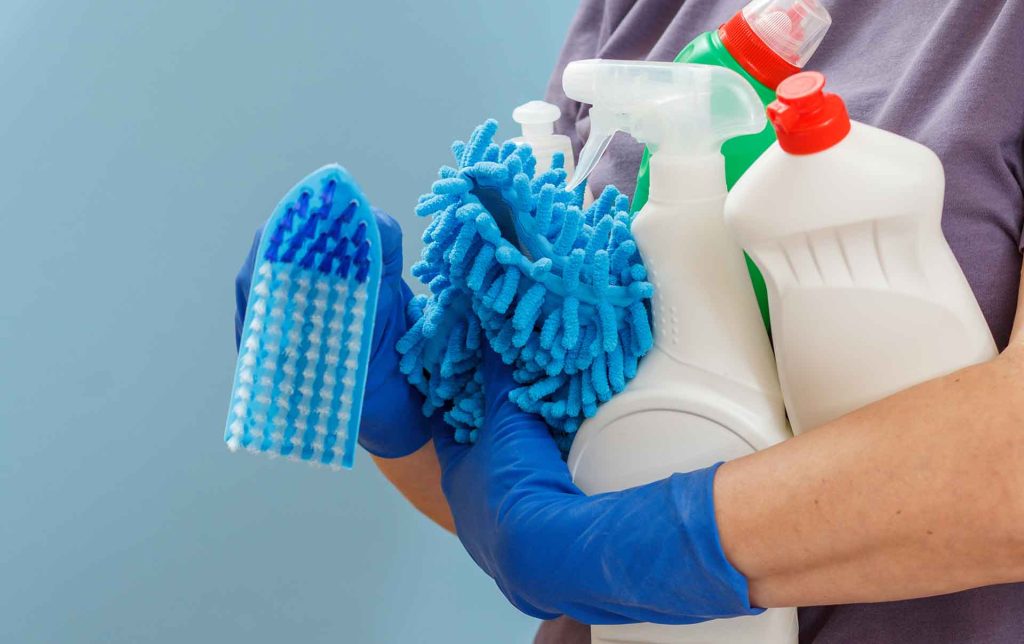10 Ways To Save On Cleaning Products
Anúncios
Saving on cleaning products can be an excellent way to start a journey toward less debt and more money. If you’re interested in learning how to save money on cleaning products, we’re here to help. Here, we highlight the benefits and 10 ways to save money on cleaning products.

Advantages of Saving on Cleaning Products
Opting for more economical cleaning products can bring numerous financial and environmental benefits. Here are some reasons why this practice can be advantageous:
Economic Savings: Saving money on cleaning products offers immediate financial relief. Choosing cheaper brands or buying in bulk can significantly reduce your monthly spending on these products.
Anúncios
Less Waste: Smaller packaging for cleaning products often comes with higher prices but can be more concentrated, requiring smaller amounts for the same results. This leads to less waste and a reduced environmental impact.
More Sustainability: Cheaper cleaning products are not always less effective, and many affordable brands also offer sustainable options. Choosing products less harmful to the environment helps preserve a healthy planet without compromising cleaning efficiency.
Efficient Use: Saving on cleaning products encourages creativity and optimization in their use. This might mean discovering different cleaning methods or using less product without sacrificing effectiveness.
1- Use Multipurpose Products
Many people underestimate the benefits of using multipurpose products in the home, mistakenly thinking that “multipurpose” is just a marketing gimmick.
Anúncios
However, it’s often unnecessary to buy a specific product for every area of the house. Many chemical formulations are designed to be effective on various surfaces.
For instance, a mixture of vinegar and baking soda works wonders in removing limescale. Additionally, multipurpose soaps and cleaners containing pine oil have been household staples for years, efficiently handling tasks like stain removal, deodorizing spaces, and cleaning floors.
2- Repurpose Old Clothes as Cleaning Rags
Instead of spending money on disposable wipes or paper towels, you can reuse old clothes to make kitchen towels or cleaning rags.
Cotton garments are especially effective for this purpose, and a single T-shirt can yield up to four kitchen rags. You can also save mismatched socks, which are great for cleaning blinds or air vents.
3- Dilute Products to Save More
Most cleaning products sold in stores are concentrated and not intended to be used directly on surfaces. Diluting them with water or using a spray bottle maintains their cleaning power while helping you save money.
To maximize product use, keep empty containers and refill them with product replacements instead of buying new ones. By diluting the contents, you can make the product last up to four times longer.
4- Add Essential Oils to Your Cleaning Routine
Essential oils are a natural way to eliminate odors and enhance the scent of your cleaning products when used with a diffuser. Alternatively, mix a few drops with water in a spray bottle to avoid purchasing commercial air fresheners.
For example, adding a few drops of lemon essential oil to your trash bins eliminates odors, while citronella oil is known for effectively repelling insects.
5- Use Only the Required Amount
Many people think using larger quantities of disinfectants, alcohol, or bleach will increase their effectiveness. However, this often leads to unnecessary waste. Reading product instructions carefully ensures surfaces are properly disinfected without overuse.
Most disinfectants provide detailed application guidelines and drying times to eliminate viruses and bacteria effectively while conserving the product.
6- Moisten Cloths Instead of Spraying Surfaces Directly
Moistening cleaning cloths or mops before applying cleaning products can save money and product use. Once the cloth absorbs enough liquid, you can clean multiple areas without reapplying the product repeatedly.
This method also prevents delicate surfaces in your home from staining or discoloring, which can happen if the product is sprayed directly onto them.
7- Develop Positive Cleaning Habits
The most important recommendation might be encouraging good hygiene habits within your household.
Small actions, such as removing shoes before entering the house, washing hands upon arrival, and assigning cleaning responsibilities, can prevent the spread of dirt, germs, and bacteria.
These practices enhance cleaning efficiency and significantly reduce the long-term use of cleaning products.
8- Maximize the Use of Fabric Softener
To get the most out of your fabric softener, many brands provide caps with measurement lines for the exact amount needed per load. Avoid pouring fabric softener directly into the washing machine to prevent waste.
For a prolonged fresh scent on clothes, add a few drops of fabric softener to a steam iron. This ensures garments like shirts, jackets, or dresses retain their aroma for longer without needing large amounts of softener in every wash.
9- Focus on Cleaning Frequently Used Areas
There’s no need to clean the entire house daily with cleaning products to make them last longer. Instead, concentrate on high-touch areas and essential surfaces.
Cleaning professionals recommend mopping high-traffic areas, such as kitchens, bathrooms, hallways, and entrances, once a week. In contrast, less frequently used rooms can be mopped every two weeks or even monthly, as long as they are vacuumed at least weekly.
10- Use Natural Remedies
Homemade cleaning solutions can be an excellent way to save money, as many common household ingredients are equally effective for various tasks. You’ll find recipes in another article to maximize these ingredients.
For instance, baking soda works well to eliminate unpleasant odors from carpets, cushions, sofas, and car upholstery. Simply sprinkle a thin layer of baking soda, let it sit for 10 minutes, and vacuum as usual.
See more: 9 steps to reduce gym spending
